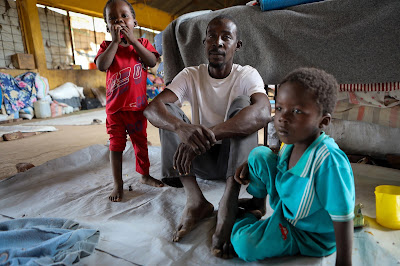“Testimonies recount unspeakable horrors - family members killed, women enduring heinous acts of abduction and sexual violence, and homes reduced to ashes. Despite the tireless efforts of humanitarian organisations and the welcoming gestures from the host communities and the government of Chad, the situation is close to catastrophic.” -Stephen Cornish, MSF Director General
“They told us that this wasn’t our country and gave us two options: immediately leave for Chad or be killed. They took some men and I saw them shooting them in the streets, with no one to bury the corpses.” -H., A refugee who fled to Adre from El Geneina X
Source: Médecins Sans Frontières (MSF) aka Doctors Without Borders
Statement by Stephen Cornish, MSF Director General
Dated 22 December 2023 - here is a copy in full:
Half a million Sudanese refugees in Chad in dire need of humanitarian aid
This week, I visited the camps in eastern Chad to witness the living conditions of Sudanese refugees.
I have worked as a humanitarian worker in countries across the globe, but what I saw in Chad in this emergency has shocked me to my core.
With such a rapid and vast displacement of people fleeing harrowing violence, the overwhelming nature of how many people have sought refuge here and knowing what made them flee is really hard on the heart.
So many people seeking refuge in the desert are relying on humanitarian aid, which is inadequate and sporadic. This cannot go on.
Despite the tireless efforts of humanitarian organisations and the welcoming gestures from the host communities and the government of Chad, the situation is close to catastrophic.
From insufficient access to food, water and shelter, to concerns about proper hygiene, it’s a daily struggle for those who have left almost everything behind. Approximately 150,000 individuals in Adre transit camp and the surrounding areas live week to week, navigating through precarious conditions to survive.
The limited food distributions happen irregularly and the amount distributed typically lasts only a couple of weeks. On top of that, not everyone is receiving these distributions.
In Adre, there’s one latrine for 300 to 400 people - far below the recommend standards. Despite tremendous efforts put forth by Médecins Sans Frontières (MSF) and local partners, delivering half a million litres of water daily, refugees only receive between six to eight litres per day.
People don't have enough water to bathe, to clean, or to cook. They don’t have suitable jerry cans in order to be able to collect and store water properly.
We've already seen a very high incidence of malnutrition, as well as high numbers of people suffering from diarrhoea and malaria. Speaking with the doctors here this week, the number of cases of malaria has decreased but it is still widespread.
Our role now is to ensure enough assistance together with other partners going forward so we don't end up in another catastrophic situation several months down the road. Today, people can survive for the next couple of months, but what will happen after that?
An elderly person collects water from a distribution point. Refugees here only receive between six to eight litres per day for drinking, bathing, cooking and cleaning. Chad, 7 December 2023.
RENAUD MASBEYE/MSF
There are many organisations here on the ground, but they don't have the financial resources to meet the needs of the people. So, we need governments, we need donor countries to help organisations on the ground to scale up and meet the emergency needs, from shelter to water to food.
The people suffering in this crisis are predominantly women and children, while many are also victims of large-scale violence.
Their testimonies recount unspeakable horrors - family members killed, women enduring heinous acts of abduction and sexual violence, and homes reduced to ashes. Their sole aspiration is to find a safe haven in Chad and be able to live in decent and dignified conditions.
These people, relocated in the desert, cannot face this ordeal alone. This cannot be put aside and forgotten as just another crisis. Solid and sustained humanitarian commitments, and an urgent scale up of aid efforts on the ground are urgently required to avoid a catastrophic crisis and large-scale misery in the months to come.
View the original report:
English https://www.msf.org/half-million-sudanese-refugees-chad-dire-need-humanitarian-aid
Arabic https://www.msf.org/ar/نصف-مليون-لاجئ-سوداني-في-تشاد-في-حاجة-ماسة-للمساعدات-الإنسانية
Explore accessibility options
ENDS







